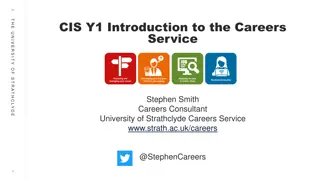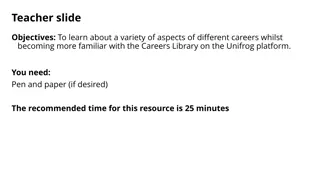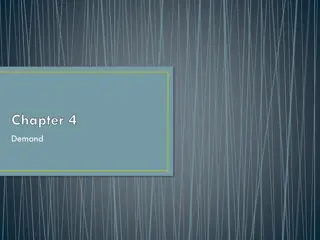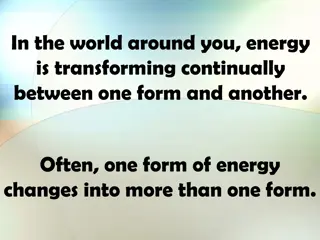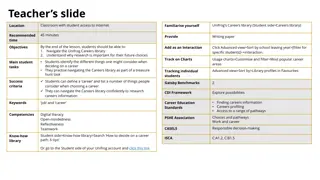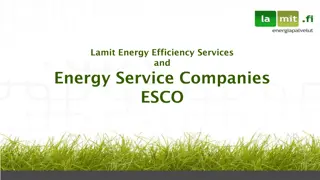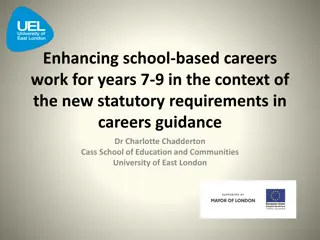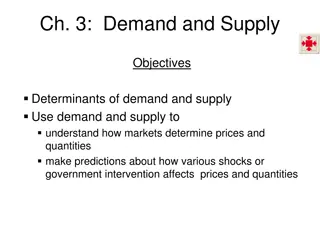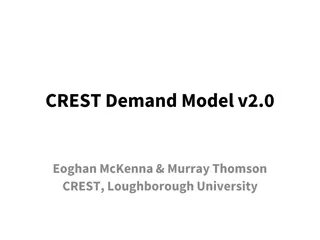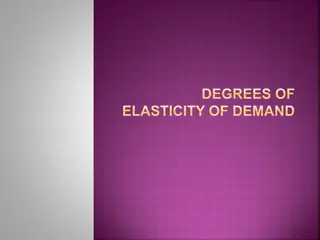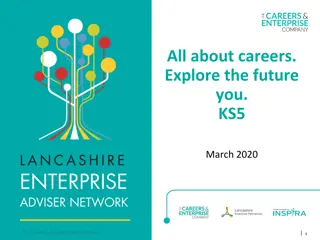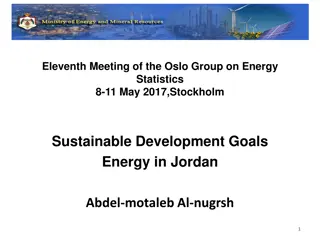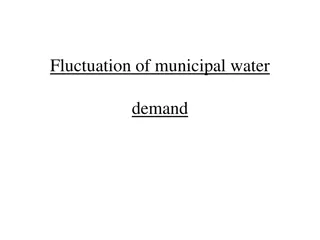Exploring Energy Career Clusters and In-Demand Careers
Discover the importance of a 17th Career Cluster in Energy, the focus on clean energy, and the impending retirement wave in the energy workforce. Explore the various in-demand energy careers falling under Science, Technology, Engineering, and Mathematics clusters. Unveil the Competency Model and specific technical competencies in the Energy Industry for different occupations.
Download Presentation

Please find below an Image/Link to download the presentation.
The content on the website is provided AS IS for your information and personal use only. It may not be sold, licensed, or shared on other websites without obtaining consent from the author. Download presentation by click this link. If you encounter any issues during the download, it is possible that the publisher has removed the file from their server.
E N D
Presentation Transcript
Adopting a 17th Energy Career Cluster Add state energy consortium logo here
Why a 17th Career Cluster in Energy? This is a grassroots state by state effort Energy jobs hidden among other clusters The Nation has a focus on a clean energy economy 50% of the energy workforce will retire in the next 5-10 years 2
Where do in-demand energy careers fall in the current career cluster system? Science, Technology, Engineering and Mathematics Clusters Architecture and Construction Manufacturing Manufacturing Production Process Development Electrical & Electronics Technician Engineering & Related Technician Power Plant Operator Nuclear Reactor Operator Gas Processing and Distribution Plant Operator Power Distributor & Dispatcher Gas Controller & Dispatcher Auxiliary. Equip. Operator Construction Boilermaker Carpenter Control & Valve Installers Electrician Electrical and Electronics Repairers Insulation Worker Iron / Metalworker Industrial Machinery Mechanics Lineworker Machinists Millwright Pipefitter Pipeline Installer Pipelayer Welder Design and Pre-construction Engineer - Civil , Chemical, Electrical, Nuclear, Mechanical, Power Systems, Energy Transmission, Environmental, Industrial Electrical & Electronics Engineering Technician Mechanical Technician Machinists Engineering and Technology Electrical Engineer Power Systems Engineer Mechanical Engineer Nuclear Engineer Chemical Engineer Civil Engineer Energy Transmission Engineer Procurement Engineer Environmental Engineer Industrial Engineer Pathways Science and Math Nuclear Chemist Nuclear Technician Materials Scientist Radiation Protection Technician Health Physicist Chemistry Technician Maintenance Operations Boilermaker Carpenter Control & Valve Installer Corrosion Technician Electrician Heavy Equipment Operator Industrial Machinery Mechanic Insulation Worker Iron / Metalworker Lineworker Millwright Pipefitter / Pipelayer Pipeline Installer Substation Mechanic Utility Metering & Regulation Technician Relay Technician Welder Maintenance, Installation & Repair Boilermaker Control & Valve Installers Corrosion Technician Pipefitter / Pipelayer Pipeline Installer Instrument & Control Tech Electrical & Instrumentation Tech Elec.. & Electronics Repairer Elec. Equipment Installer / Repairer Industrial Machinery Mechanic Millwright Welder Logistics & Inventory Control Heavy Materials Technician Quality Assurance Quality Control Tech Quality Assurance Tech
The Energy Industry has a Competency Model (Generation, Transmission & Distribution) Tier 6-8 Occupation-Specific Competencies Substation Technician Engineering Technician Relay Technician Natural Gas Technology Lineworker Electrical Technician Mechanical Technician Alternate Fuel Technicians Instrument & Control Technician Plant Operator Tier 5 Industry-Specific Technical Competencies Electric Transmission & Distribution Non-Nuclear Generation (Coal, Natural Gas, Oil, Hydro, Solar, Wind, Biofuel, Geothermal) Tier 4 Industry-Wide Technical Competencies Gas Transmission & Distribution Nuclear Generation Environmental Laws & Regulations Quality Control & Continuous Improvement Industry Principles & Concepts Safety Awareness Troubleshooting Tier 3 Workplace Competencies Employability & Entrepreneurship Skills Planning, Organizing & Scheduling Working with Basic Hand & Power Tools & Technology Following Directions Business Fundamentals Problem Solving Decision Making Teamwork Ethics Tier 2 Academic Competencies Locating, Reading & Using Information Engineering & Technology Critical & Analytical Thinking Information Technology Listening Science Mathematics Speaking Writing Tier 1 Personal Effectiveness Competencies Interpersonal Skills Dependability & Reliability Self- Flexibility & Adaptability Ability To Learn Integrity Professionalism Reputation Motivation Development
Sample Knowledge and Skill Statements for a 17th Energy Career Cluster EN04.02 Industry Principles and Concepts: Knowing the basic and emerging principles and concepts that impact the energy industry, including: energy production, energy transmission and alternative energy technologies Is able to explain the flow of energy from generation through distribution to the customer Is able to explain the role of regulators and unions in the industry Discuss the history of the United States energy industry/infrastructure (refer to Energy Information Administration - www.eia.doe.gov ) Identify the role and function of generation, transmission and distribution organizations Explain the role of regulatory bodies in the energy industry (such as: Federal Energy Regulatory Commission - www.ferc.gov ; State Public Service Commissions) highlighting the concept of obligation to serve Explain the different structures of energy companies, including investor- owned utilities, municipalities (associated utility practices such as water/ wastewater), electric cooperatives, independent power producers and is able to explain the different lines of energy business, including electric and gas Describe the process of metering and billing for energy consumption EN04.02.01 EN04.02.02 EN04.02.03 EN04.02.04 EN04.02.05 EN04.02.06 EN04.02.07 EN04.02.08 Demonstrate an awareness of alternative and renewable energy technologies, including geothermal energy, solar energy, wind energy, water energy and biofuel 5
Plan of Study for an Energy Career Cluster Name Learner ID School/College/U niversity Energy Career Cluster Plan of Study LEVELS Other Required Courses Other Electives Recommended Electives Learner Activities EDUCATION SAMPLE Occupations Relating to This Career Cluster English/ Language Arts Math Science Social Studies/ Sciences Career and Technical Courses GRADE Interest Inventory Administered and Plan of Study Initiated for all Learners English/ Language Arts I Biomass and Biofuels Technician Electrician Electrical & Electronics Repairer Electrical & Electronics Technician Electrical & Instrumentation Technician Energy Generation Technician Engineering Technician Gas Processor & Distribution Plant Operator Gas Service Technician Generation Technician Geothermal Technician Hydropower & Marine Energy Technician Instrumentation Control Technician Metering Technician Nuclear Reactor Operator Nuclear Technician Pipefitter Pipelayer Pipeline Installer Power Distribution Technician Power Plant Operator Solar Photovoltaic Installer Solar Photovoltaic Technician Solar Technician Welder Wind Turbine Technician Algebra I Earth or Life or Physical Science State History Civics or World History All plans of study should meet local and state high school graduation requirements and college entrance requirements. Certain local student organization activities such as SkillsUSA are also important including public speaking, record keeping and work-based experiences. *Energy Industry Fundamentals 9 English/ Language Arts II Geometry Biology U.S. History **Introduction to Alternative Energy 10 SECONDARY English/ Language Arts III Technical Writing Algebra II Physics Economics Psychology Continue courses pertinent to occupational specialty 11 Contineu course pertinent to occupational specialty College Placement Assessments-Academic/Career Advisement Provided English/ Language Arts IV Trigonometry Chemistry 12 Articulation/Dual Credit Transcripted-Postsecondary courses may be taken/moved to the secondary level for articulation/dual credit purposes. English Composition English Literature occupation Dependent on chosen Physics American Govt. or History, plus Psychology/ Interpersonal Skills All plans of study need to meet learner's career goals with regard to required degrees, licenses, certifications or journey worker statuts. Certain local student organization activities may also be important to include. Continue courses pertinent to the occupation y selected. Year 13 Speech/ Oral Communication Dependent on chosen occupation Environmental Science Sociology Business Law POSTSECONDARY Year14 Year 15 Continue courses in the area of specialization. Year 16 *Energy Industry Fundamentals: The Get Into Energy Industry Fundamentals provides a broad understanding of the Electric and Natural Gas Utility industry and the energy generation, transmission, and distribution infrastructure, commonly called the largest machine in the world , which forms the backbone for the industry. The curriculum includes business models, regulations, types of energy and their conversion to useable energy such as electric power, how generated power is transmitted and distributed to the point of use, emerging technologies and the connection to careers in the energy industry. **Introduction to Alternative Energy: Identifies the need for alternative energy development. and the contributions and potential of individual alternative energy sources. The course also covers the present U.S. electrical grid and issues affecting specific alternative energy source tie-in and reliability. 6
Job Categories for the 17th Cluster Biomass and Biofuels Technician Electrician Electrical & Electronics Repairer Electrical & Electronics Technician Electrical & Instrumentation Technician Energy Generation Technician Engineering Technician Gas Processor & Distribution Plant Operator Gas Service Technician Generation Technician Geothermal Technician Hydropower & Marine Energy Technician 7
Job Categories for the 17th Cluster Instrumentation Control Technician Metering Technician Nuclear Reactor Operator Nuclear Technician Pipefitter Pipelayer Pipeline Installer Power Distribution Technician Power Plant Operator Solar Photovoltaic Installer Solar Photovoltaic Technician Solar Technician Welder Wind Turbine Technician 8
Which states have adopted a 17th career cluster in Energy? (as of March 2012) Florida Georgia In process: California Indiana Virginia 9
17th Career Cluster ENERGY 1st in the Nation!!
2012-13 Florida Energy Career Cluster Curriculum Frameworks Secondary and PSAV Programs/Courses Power Distribution Technician (9700100 / X600100) (RTF, 393KB) New Energy Generation Technician (9700200 / X600200) (RTF, 334KB) New Solar Energy Technology (8006100 / A600200) (RTF, 444KB) New PSAV Programs Only Electrical Line Service and Repair (PSAV - I460303) (RTF, 293KB) Solar Thermal System Design, Installation and Maintenance Entry Level (PSAV - X600300) (RTF, 273KB) New Degree & Certificate Programs/Courses Electrical Distribution Technology (AAS/AS - 0615030201) (RTF, 319KB) Electrical Dist Technology Advanced (CCC - 0615030202) (RTF, 304KB) Electrical Dist Technology Basic (CCC - 0615030203) (RTF, 256KB) Electrical Power Technology (AAS/AS - 0615030200) (RTF, 320KB) Alternative Energy Engineering Technology (CCC - 0615030204) (RTF, 213KB) 12
2012-13 Florida Energy Career Cluster Curriculum Frameworks Applicable Level 6-8 Fundamentals of Energy (9790300) (RTF, 319KB) New Introduction to Energy (9709350) (RTF, 224KB) New Introduction to Energy and Career Planning (9709360) (RTF, 200KB) New Applicable Level 9-12, 30-31 Energy Cooperative Education-OJT (9700420 / X909999) (RTF, 232KB) New Energy Directed Study (Secondary - 9701000) (RTF, 292KB) New 13
Sample Energy Career Cluster Adoption for Technical Colleges (from Georgia) Being converted to a dual enrollment program Algebraic Concepts Print Reading & Problem Solving Mechanical Laws & Principles History & Structure of the Energy Industry Electrical Power & Natural Gas Generation, Transmission & Distribution 14
Sample Energy Career Cluster Adoption for Technical Colleges (from Georgia) Energy Industry Fundamentals Introduction to Alternative Energy Basic Circuit Analysis (Total of 27 credit hours) 15
For more information, contact: Name Title Contact Information




